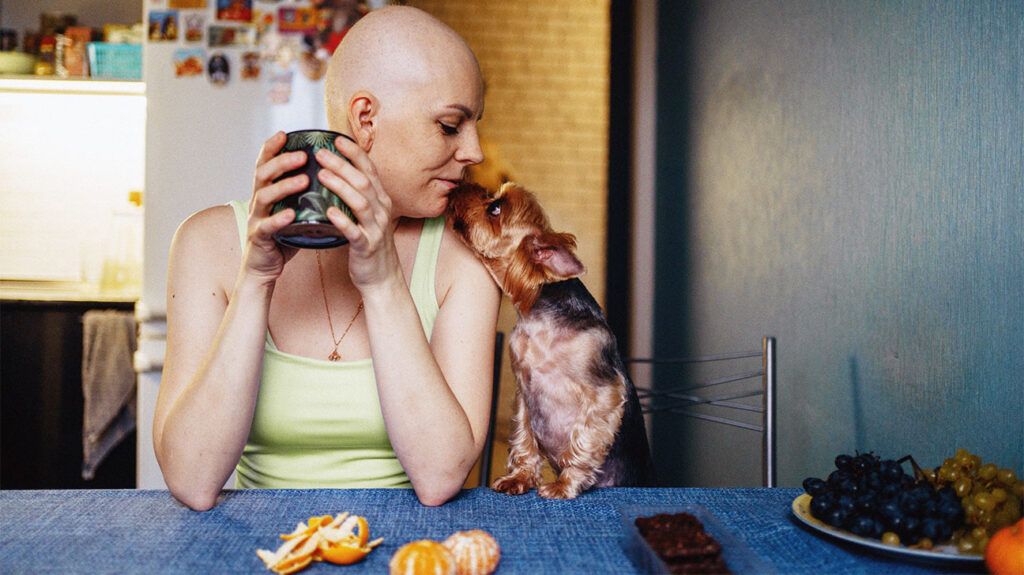Small cell lung cancer (SCLC) may increase the risk of pneumonia due to a weakened immune system or structural changes to the lungs.
SCLC is one of the two main types of lung cancer. Pneumonia is an infection of the lungs due to bacteria, viruses, or fungi.
This article looks at the link between SCLC and pneumonia, and the diagnosis, treatment, prevention, and outlook of pneumonia in people with SCLC.

A 2019 article notes pneumonia occurs in
People with SCLC may be more vulnerable to developing infections because cancer and cancer treatments can weaken the immune system.
Although effective treatments for SCLC, radiotherapy and immunotherapy can increase the risk of developing pneumonia. Chemotherapy can also
Pneumonia can also be a
Lung cancer can also cause changes to the structure of the lungs which can increase the risk of infections.
Post-obstructive pneumonia is a type of pneumonia that occurs due to a blockage in the airways. This causes fluid and mucus to build up behind it, leading to infection. A blockage of the airways, or bronchial obstruction, is more common with SCLC than some other types of tumors.
Both SCLC and pneumonia can cause shortness of breath and fatigue. However, the other symptoms differ.
Other symptoms of pneumonia include:
- cough, with or without mucus
- chest pain when coughing or breathing
- headaches
- muscle pain
- nausea
- fever
- chills
- vomiting
- diarrhea
Other symptoms of SCLC include:
- a worsening or persistent cough
- coughing up blood or reddish phlegm
- wheezing
- appetite loss
- unexplained weight loss
- hoarse voice
- persistent or recurring infections, such as bronchitis
To diagnose pneumonia in people with SCLC, doctors may carry out
- blood gas test, which measures oxygen levels in the blood
- sputum test, which tests a spit or mucus sample for pneumonia-causing germs
- blood culture, which tests for germs in the blood, and checks if a bacterial infection has spread to the bloodstream
- polymerase chain reaction (PCR) test, which uses a blood or sputum sample to identify the DNA of the germ causing the pneumonia
- bronchoscopy, to look inside the airways and collect tissue samples to find the cause of pneumonia
- CT scan, to see how much of the lungs the pneumonia is affecting
- thoracentesis, in which a doctor takes a fluid sample from the space between the lungs and the chest wall to test for bacteria
Treating pneumonia in people with SCLC may depend on the severity of the pneumonia and a person’s overall health.
Home treatment
If the pneumonia is mild, people may be able to treat it at home. A doctor may advise prescription or over-the-counter (OTC) medications,
- antibiotics, if a bacterial infection is causing pneumonia
- antiviral medication, for viral pneumonia, although this is not effective for every person
- antifungal medication, for people with cases of fungal pneumonia
- OTC medications to manage symptoms, such as fever, muscle pain, or breathing difficulties
Hospital treatment
For people with
People may also receive oxygen therapy, which increases oxygen levels in the blood. Some people may need a ventilator to assist with breathing.
Taking steps to prevent pneumonia is important for those with SCLC. Steps that
- getting a pneumococcus vaccine, which prevents pneumococcus bacterial infections, and is particularly important for people with cancer
- getting a yearly flu vaccine
- washing the hands regularly to get rid of germs
- avoiding smoking
- strengthening the immune system with physical activity and healthy eating
- for any swallowing difficulties, eating smaller meals with thicker food may help prevent any food from reaching the lungs
- elevating the head of the bed to help prevent saliva from getting into the lungs when sleeping
Reducing the risk of infections is important. Professional oral care and hygiene around the time of surgery
The outlook of pneumonia with SCLC may depend on the severity of the pneumonia, the stage of SCLC, and factors, such as age and the person’s overall health.
A large-scale
A weakened immune system and respiratory failure due to cancer treatment may worsen the outlook of pneumonia in people with cancer.
Can a person with cancer survive having pneumonia?
Pneumonia can be serious in people with cancer, but early diagnosis and treatment may improve outlook.
What lung cancer mimics pneumonia?
Lung adenocarcinoma, a subtype of non-small cell lung cancer,
Small cell lung cancer (SCLC) may increase the risk of pneumonia due to a weakened immune system, cancer treatments, and changes in lung structure.
Cancer can increase the risk of serious complications with pneumonia, so prevention or early diagnosis and treatment are important.
